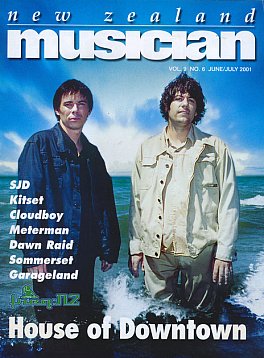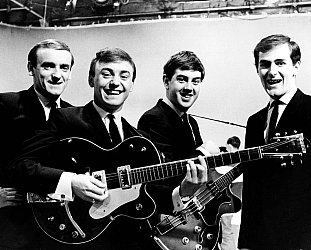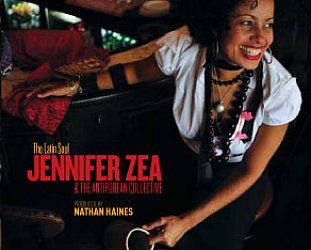Graham Reid | | 7 min read

As House of Downtown, Ercolano and Todd have reasons to be cheerful. Their debut album Release, which bridges the gap between house and r'n'b (the latter courtesy of Sydney-based gospel-funk singer Tulele Falatolo), is finally out.
For HoD it has been a frustrating but fascinating two-year journey to get to this point.
In '99 they signed with international heavy-hitter Universal Music and two days later lost their first songs when their computer crashed. Then they were sidetracked by recording for and compiling the Stickmen movie soundtrack. Then there were re-recordings, time in Europe touting their product, home to rethink and re-record, a three-week trip to London to mix and master, forming their own State House label, lawyers ...
"Yeah, it's a good feeling to be able to finally get the album out to people who've been waiting so long," says Todd. "All the songs were finished in December so we've been sitting on it for a while."
Ercolano laughs about the delay: "The thing with dance music is most people go in, get the vibe right and get it out. Because songs don't last long in dance. If we're spending more than two months on a song, maybe it's only got two months anyway. If it's a good song!"
But HoD have the goods. Release is the kind of house album alongside Basement Jaxx and Daft Punk, whom they mention as "the competition," that you'll play at home. With a high-profile release party on Friday at the St James, the underground sound of HoD is poised to go overground.
And not just locally. As longtime and acclaimed local DJs with European connections, HoD have an eye for the international market. The album has been tailored for it as a result of time in the UK and France last year.
"We thought we had all these good songs, no throwaways, "says Ercolano, "but in the UK they said we had three great songs and what we needed was three brilliant ones."
So, mindful of Neil Finn's caution that in New Zealand it's too easy to go to the beach, they "holed up in Three Kings," says Ercolano, "so we weren't being distracted by Ponsonby Rd and people coming around saying, 'Why don't you do that?' We removed ourselves from Auckland."
With a clearer focus, they began to craft what became Release, which retains a slightly low-resolution quality courtesy of older gear like Joe Meek's equipment built in '67, optical compressors, solid state filters "and two Pro-Tools systems."
Ercolano: "Computers don't make it fun, they make it flexible, that's all. They can do a lot of things, but they do you no favours. Old school equipment is more fun. A lot of our gear isn't new."
"We are a raw band and it's about raw energy," says Todd, "especially on this album."
Release is an album where soul goes to the disco, says Ercolano, and what they wanted to capture was the "melting pot here."
"[Auckland DJ] Greg Churchill or whoever will go to a record shop every week and buy the same amount from France, the UK, San Francisco and New York, and that's what we're trying to say. We wanted songs that could play on George, bFM and Mai."
"A lot of these songs you couldn't really play in clubs," says Todd, acknowledging they recorded with the intention of having something for people at home as much as radio. And that came down to having snappy songs, something they learned when visiting their favourite labels: Yellow, Barclays, Flipside, Classic in Europe and watching French fingers on the skip button.
Ercolano: "You'd be sitting in Barclays in Paris and they'd go, 'Ah, we like zees one,' but another would have a boring intro beat and they just hit the skip. What we learned is if you go into A&R you have to cut everything down to pop song length. It's that, 'five words or less thing.' It was what they didn't say that we learned from."
The trip to London to mix and master was essential, again to have their sound heard by other ears, in this case former Kiwi and mix-man Mike Nielsen (of Lava Lava, and who mixes for Underworld and Jamiroquai). They established a quick rapport, shopped for soul diva albums together (Destiny's Child and Jill Scott) and "he knew exactly what we wanted to do," says Todd.
Nielsen worked in a way HoD hadn't previously considered.
"Before we went," says Todd, "we thought you stood in front of two speakers and think, 'What's out left?' and 'What's out right?' But it's thinking, 'How far back is it supposed to be?' That's what Mike did; he gave us the sense of spatial dimension. He gets control of what you are doing but gets you what you want to get."
Over time, with some paring back, the dropping of expensive and ultimately unnecessary samples, and adding texture ("Rise Above is big, heavy funk song which started as a light gospel track," says Todd), the album took shape. It's been two years in the making but Release is out, the first fully-fledged dance album out of this country. They seem relieved.
Ercolano: "I've never tried to say we're clever, just a bit more hard-working. When we came back from the UK we redid all our bridges. One of the things I'd heard was whoever wrote the song out of the Beatles, the other would write the bridge. So we went back and did what we call effects shots. Rise Above's got the Charles De Gaulle Airport on it where the sound goes right down quiet and narrow."
Todd explains: "When you come out of the airport it goes into this tunnel and it is really quiet, then the doors open and you're outside and it's bang! That's what we wanted it to sound like."
Both concur an album's emotional feel is important. The slightly unpolished nature of the older equipment lends an honesty.
Todd: "With house, like rock, it's getting over-produced and over-polished and the technology is allowing you to do all these wonderful things. But the average punter won't notice a great mix, but will notice a bad song. And if it's a bad song and a great mix, who cares?"
Ercolano: "I saw organic tomatoes the other day and was so excited about seeing blemishes and all the crazy sizes ... they're going to start breeding blemishes on super tomatoes. I had a tomato the other day and it tasted like a cucumber! And that's what is happening to music.
"I've got a favourite era of '96 house where it was all crappy and chuggy and wasn't polished. The vibe was more important.
"We're DJs and in the maitre d' business of working crowds and asking ourselves, 'Are they happy?' If not you have to dig deeper in your crate."
Release is the result of some deep digging, and not just musical. Although they say it was recorded for the price of a UK single, with airfares and three weeks in London, the 10 days in Paris and studio time what has it has cost them ... ?
"I can tell you exactly," says Todd. "34k."
The game plan now is to work the local market in the hope Universal's international offices will pick it up.
If not, they have those Euro connections for themselves - and their State House label, for which they have already signed three other acts and are negotiating licensing deals in the Northern Hemisphere. Release is their business card.
And talk of having the first dance album out of New Zealand?
Ercolano: "I'd like people to think, 'Okay, we've got to be better than them now.' One of our jobs is to be the smart-arse loudmouths, who are just a bit too cheeky and public.
"I'd like people to think, 'Right, we're going to nail you.'
"We just want to up the game."
With the long overdue Release, House of Downtown can certainly claim to have done that.





post a comment